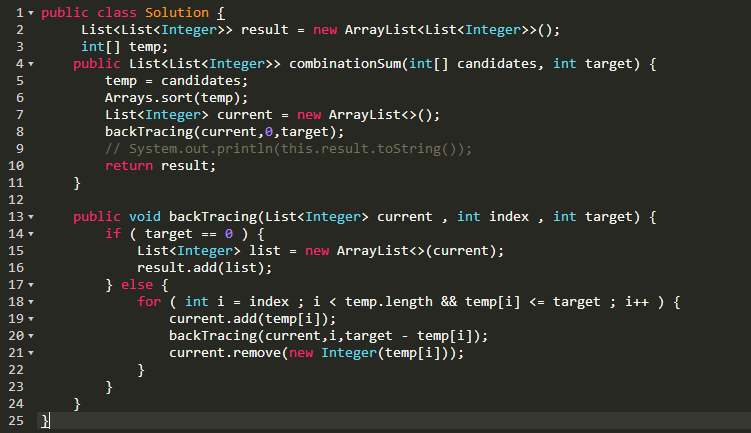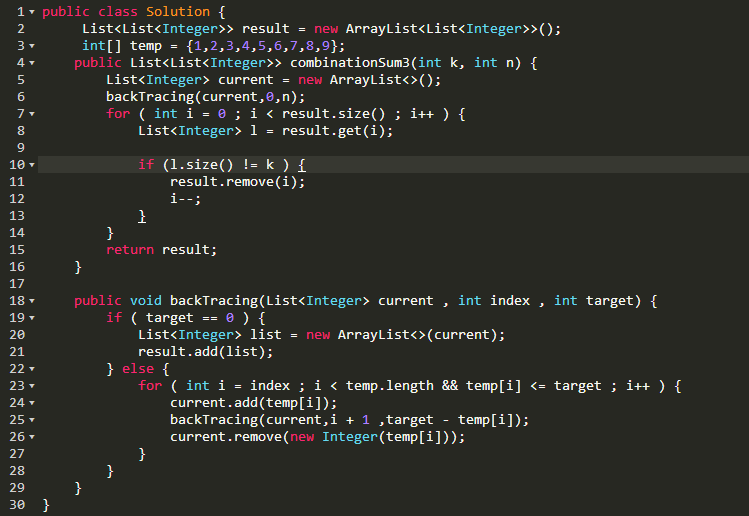Leetcode 之 Combination Sum系列
39. Combination Sum
1.Problem
Find all possible combinations of k numbers that add up to a number n, given that only numbers from 1 to 9 can be used and each combination should be a unique set of numbers.
Example 1:
Input: k = 3, n = 7
Output:
[[1,2,4]]
Example 2:
Input: k = 3, n = 9
Output:
[[1,2,6], [1,3,5], [2,3,4]]
2.Solution
题目的大意是给定一个元素不存在重复的一维数组candidates和一个目标数target,输出由一位数组中的数可以组成target的所有组合类型,注:candidates中的数可以重复使用的。
对给定的数组进行排序,然后针对target进行回溯。
3.Code

1 package test; 2 3 import java.util.ArrayList; 4 import java.util.Arrays; 5 import java.util.List; 6 7 public class TaskTest { 8 private List<List<Integer>> result = new ArrayList<List<Integer>>(); 9 private int[] temp; 10 public static void main(String[] args) { 11 int[] a = {2,3,6,7}; 12 13 new TaskTest().combinationSum(a,7); 14 //System.out.println(); 15 } 16 17 public List<List<Integer>> combinationSum(int[] candidates, int target) { 18 //[2, 3, 6, 7] and target 7 19 this.temp = candidates; 20 Arrays.sort(temp); 21 List<Integer> current = new ArrayList<>(); 22 backTracing(current,0,target); 23 System.out.println(this.result.toString()); 24 return result; 25 } 26 27 public void backTracing(List<Integer> current , int index , int target) { 28 if ( target == 0 ) { 29 List<Integer> list = new ArrayList<>(current); 30 result.add(list); 31 } else { 32 for ( int i = index ; i < temp.length && temp[i] <= target ; i++ ) { 33 current.add(temp[i]); 34 backTracing(current,i,target - temp[i]); 35 current.remove(new Integer(temp[i])); 36 } 37 } 38 } 39 }
4.提交Leetcode的代码

40. Combination Sum II
1.Problem
Given a collection of candidate numbers (C) and a target number (T), find all unique combinations in C where the candidate numbers sums to T.
Each number in C may only be used once in the combination.
Note:
- All numbers (including target) will be positive integers.
- The solution set must not contain duplicate combinations.
For example, given candidate set [10, 1, 2, 7, 6, 1, 5] and target 8,
A solution set is:
[ [1, 7], [1, 2, 5], [2, 6], [1, 1, 6] ]
2.Soluton
Combination Sum II跟 I比不同点在于,II中的一维数组中元素允许重复,但是组成target的每个元素仅允许被使用一次
- backTracing(current,i + 1 ,target - temp[i]); 位置变为 i + 1
- 处理结果中存在的重复问题
- 输出的结果跟顺序无关,即([[1,1,6],[1,2,5],[1,7],[2,6]]) 和([[1,2,5],[1,1,6],[2,6],[1,7]])是相同的,都是正确的结果
3.Code

1 package test; 2 3 import java.util.ArrayList; 4 import java.util.Arrays; 5 import java.util.HashSet; 6 import java.util.Iterator; 7 import java.util.List; 8 import java.util.Set; 9 10 public class TaskTest { 11 private List<List<Integer>> result = new ArrayList<List<Integer>>(); 12 private int[] temp; 13 public static void main(String[] args) { 14 int[] a = {1,1,2,5,6,7,10}; 15 16 17 new TaskTest().combinationSum(a,8); 18 //System.out.println(); 19 } 20 21 public List<List<Integer>> combinationSum(int[] candidates, int target) { 22 //[2, 3, 6, 7] and target 7 23 this.temp = candidates; 24 Arrays.sort(temp); 25 List<Integer> current = new ArrayList<>(); 26 backTracing(current,0,target); 27 System.out.println(this.result.toString()); 28 Set<List<Integer>> set = new HashSet<>(); 29 for (List<Integer> l : result ) { 30 if ( !set.contains(l)) { 31 set.add(l); 32 } 33 } 34 System.out.println(set.toString()); 35 result.clear(); 36 Iterator<List<Integer>> i = set.iterator(); 37 while ( i.hasNext() ) { 38 result.add(i.next()); 39 } 40 System.out.println(result.toString()); 41 return result; 42 } 43 44 public void backTracing(List<Integer> current , int index , int target) { 45 if ( target == 0 ) { 46 List<Integer> list = new ArrayList<>(current); 47 result.add(list); 48 } else { 49 for ( int i = index ; i < temp.length && temp[i] <= target ; i++ ) { 50 current.add(temp[i]); 51 backTracing(current,i + 1 ,target - temp[i]); 52 current.remove(new Integer(temp[i])); 53 } 54 } 55 } 56 }
4.提交Leetcode的代码

216. Combination Sum III
1.Problem
Find all possible combinations of k numbers that add up to a number n, given that only numbers from 1 to 9 can be used and each combination should be a unique set of numbers.
Example 1:
Input: k = 3, n = 7
Output:
[[1,2,4]]
Example 2:
Input: k = 3, n = 9
Output:
[[1,2,6], [1,3,5], [2,3,4]]
2.Solution
一维数组固定为{1,2,3,4,5,6,7,8,9},要求了组成target的数的个数,同样要求数字不能重复使用
3.Code

package test; import java.util.ArrayList; import java.util.Arrays; import java.util.HashSet; import java.util.Iterator; import java.util.List; import java.util.Set; public class TaskTest { private List<List<Integer>> result = new ArrayList<List<Integer>>(); private int[] temp = {1,2,3,4,5,6,7,8,9}; public static void main(String[] args) { new TaskTest().combinationSum(3,9); //System.out.println(); } public List<List<Integer>> combinationSum(int k, int target) { //[2, 3, 6, 7] and target 7 List<Integer> current = new ArrayList<>(); backTracing(current,0,target); for ( int i = 0 ; i < result.size() ; i++ ) { List<Integer> l = result.get(i); if (l.size() != k ) { System.out.println(l.toString()); result.remove(i); i--; } } System.out.println(result.toString()); return result; } public void backTracing(List<Integer> current , int index , int target) { if ( target == 0 ) { List<Integer> list = new ArrayList<>(current); result.add(list); } else { for ( int i = index ; i < temp.length && temp[i] <= target ; i++ ) { current.add(temp[i]); backTracing(current,i + 1 ,target - temp[i]); current.remove(new Integer(temp[i])); } } } }
4.提交Leetcode的代码

377. Combination Sum IV
1.Problem
Given an integer array with all positive numbers and no duplicates, find the number of possible combinations that add up to a positive integer target.
Example:
nums = [1, 2, 3] target = 4 The possible combination ways are: (1, 1, 1, 1) (1, 1, 2) (1, 2, 1) (1, 3) (2, 1, 1) (2, 2) (3, 1) Note that different sequences are counted as different combinations. Therefore the output is 7.
2.Solution
动态规划,转移方程为:dp[n] = dp[n] + dp[n-nums[k]] (dp[0] = 1, 即n - nums[k] == 0时 ),dp[i] 代表给定的数组能组成i的种类数
3.Code
class Solution {
public int combinationSum4(int[] nums, int target) {
int[] dp = new int[target + 1];
dp[0] = 1;
Arrays.sort(nums);
DP(target , nums , dp);
return dp[target];
}
public void DP ( int target , int[] nums , int[] dp ) {
for ( int i = 1 ; i <= target ; i++ ) {
for ( int j = 0 ; j < nums.length ; j++ ) {
if ( i - nums[j] >= 0 ) {
dp[i] = dp[i] + dp[ i - nums[j] ];
} else {
break;
}
}
}
}
}
//预先对nums进行排序然后循环中加break,leetcode 提交从18.02%提升到65.16%
4.提交Leetcode的代码




